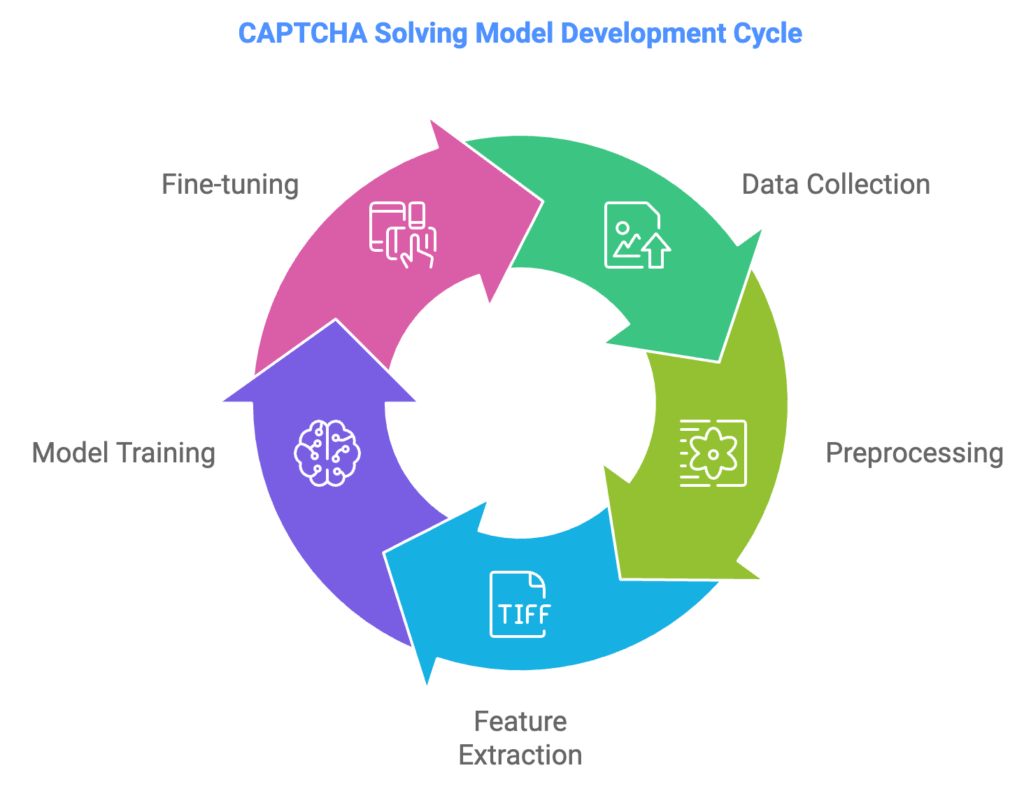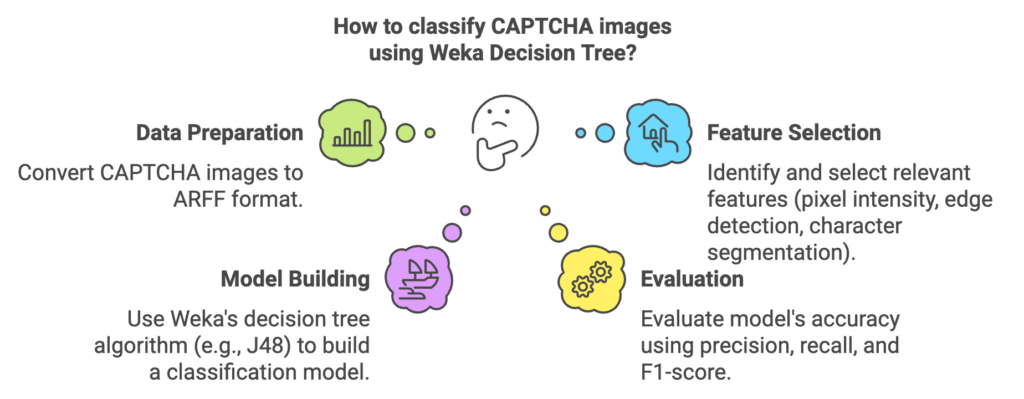CAPTCHA (Completely Automated Public Turing test to tell Computers and Humans Apart) is a common security mechanism used by websites to prevent automated access, such as web scraping bots. CAPTCHA-solving services have emerged as a solution for bypassing these security measures, enabling more seamless web scraping. Let’s explore how these services work, the role of machine learning models, and their integration into web scraping workflows.
What are CAPTCHA-Solving Services?
Overview
CAPTCHA-solving services are third-party solutions designed to automatically solve CAPTCHA challenges, allowing bots to continue their tasks without manual intervention. These services can range from simple image recognition systems to more complex AI-driven models.
- Text-based CAPTCHA: Users are asked to identify and enter distorted characters.
- Image-based CAPTCHA: Users must select images matching a specific criterion (e.g., select all images with traffic lights).
- ReCAPTCHA: A more advanced CAPTCHA system developed by Google that often involves behavioral analysis and image recognition challenges.
Machine Learning Models in CAPTCHA Solving
Training Models
Machine learning models can be trained to recognize and solve CAPTCHA challenges. These models typically use supervised learning, where a large dataset of labeled CAPTCHA images is used to train the model.

Steps to Build a CAPTCHA-Solving Model
- Data Collection: Gather a diverse set of CAPTCHA images to train the model. This dataset should include various types and difficulty levels of CAPTCHA.
- Preprocessing: Clean and preprocess the images to enhance the model’s accuracy. This may involve converting images to grayscale, noise reduction, and normalization.
- Feature Extraction: Extract relevant features from the CAPTCHA images, such as edges, contours, and shapes, to help the model identify patterns.
- Model Training: Train a machine learning model, such as a convolutional neural network (CNN), to classify and solve the CAPTCHA images.
- Fine-tuning: Use techniques like hyperparameter tuning and cross-validation to optimize the model’s performance.
Using Weka Decision Tree for CAPTCHA Classification
Weka is a popular machine learning software that provides a suite of machine learning algorithms, including decision trees. A decision tree can be used to classify CAPTCHA images based on extracted features.

Steps to Implement a Weka Decision Tree
- Data Preparation: Convert the CAPTCHA images into a format compatible with Weka, such as ARFF (Attribute-Relation File Format).
- Feature Selection: Identify and select the most relevant features for classification, such as pixel intensity, edge detection, and character segmentation.
- Model Building: Use Weka’s decision tree algorithm (e.g., J48) to build a classification model.
- Evaluation: Evaluate the model’s accuracy using metrics like precision, recall, and F1-score.
- Fine-tuning: Adjust parameters and features to improve the model’s performance.
Integrating CAPTCHA-Solving Services into Web Scraping
Automating CAPTCHA Solving
Once a CAPTCHA-solving model is trained and fine-tuned, it can be integrated into web scraping workflows to automate the solving process.
Steps to Integrate CAPTCHA-Solving Services

- Detection: Implement logic in your scraping script to detect when a CAPTCHA challenge is presented.
- CAPTCHA Solving: Use the trained machine learning model or a third-party CAPTCHA-solving service API to solve the challenge.
- Database Integration: Store the solved CAPTCHA results in a database for future reference and reuse. This can help in training the model further and improving its accuracy over time.
- Action Execution: Once the CAPTCHA is solved, resume the scraping process by interacting with the website as a human user would.
Benefits of Using CAPTCHA-Solving Services in Web Scraping
- Efficiency: Automates the CAPTCHA-solving process, reducing manual intervention and speeding up scraping tasks.
- Reliability: Improves the reliability of web scraping bots by ensuring they can bypass security measures consistently.
- Scalability: Enables large-scale scraping projects by handling CAPTCHA challenges at scale.
Popular CAPTCHA-Solving Services
- 2Captcha: This widely used service offers a comprehensive suite of CAPTCHA solving solutions, including text-based, image-based, and reCAPTCHA challenges. 2Captcha leverages a vast network of human solvers to tackle complex CAPTCHAs, ensuring high accuracy and fast turnaround times.
- DeathByCaptcha: Known for its speed and reliability, DeathByCaptcha employs a similar model to 2Captcha, utilizing a global network of human workers to solve CAPTCHAs. It specializes in handling more challenging CAPTCHA types, including those with complex image recognition requirements.
- Anti-Captcha: This service focuses on providing high-quality CAPTCHA solutions through a combination of automated algorithms and human intervention. Anti-Captcha boasts advanced machine learning models that can effectively solve a wide range of CAPTCHAs, while its human review system ensures accuracy for more intricate challenges.
These services generally work by receiving CAPTCHA images from a user’s script, then routing them to a network of solvers. These solvers, often human workers in developing countries, are paid a small fee for each CAPTCHA they successfully solve. The solved CAPTCHA data is then returned to the user, allowing their script to proceed.
Ethical and Legal Considerations
While CAPTCHA-solving services offer undeniable benefits for web scraping and automation, their use raises ethical concerns.
Malicious
One major concern is the potential for misuse. Malicious actors could exploit these services to flood websites with automated requests, overwhelming servers and disrupting legitimate users. This type of abuse can lead to denial-of-service attacks, spam campaigns, and even data breaches. Additionally, bypassing CAPTCHAs designed to protect sensitive information could facilitate unauthorized access and identity theft. It’s crucial to remember that using CAPTCHA-solving services ethically requires adhering to website terms of service, respecting rate limits, and avoiding any activities that could harm or exploit others.
Ethical Scraping
While CAPTCHA-solving services can enhance scraping efficiency, it’s crucial to adhere to ethical guidelines and website terms of service. Always seek permission and respect the website’s robots.txt file and API rate limits.
Legal Implications
Bypassing CAPTCHA may violate a website’s terms of service and could lead to legal consequences. It’s essential to understand the legal landscape and ensure compliance with relevant laws and regulations.
Conclusion
CAPTCHA-solving services play a vital role in modern web scraping, enabling bots to bypass security measures and extract data efficiently. By leveraging machine learning models and tools like Weka, developers can build robust CAPTCHA-solving systems that integrate seamlessly into their scraping workflows. However, it’s crucial to approach web scraping ethically and legally, respecting website policies and user privacy.
Related Articles:
Navigating CAPTCHAs in Web Scraping: The Role of CAPTCHA-Solving Services